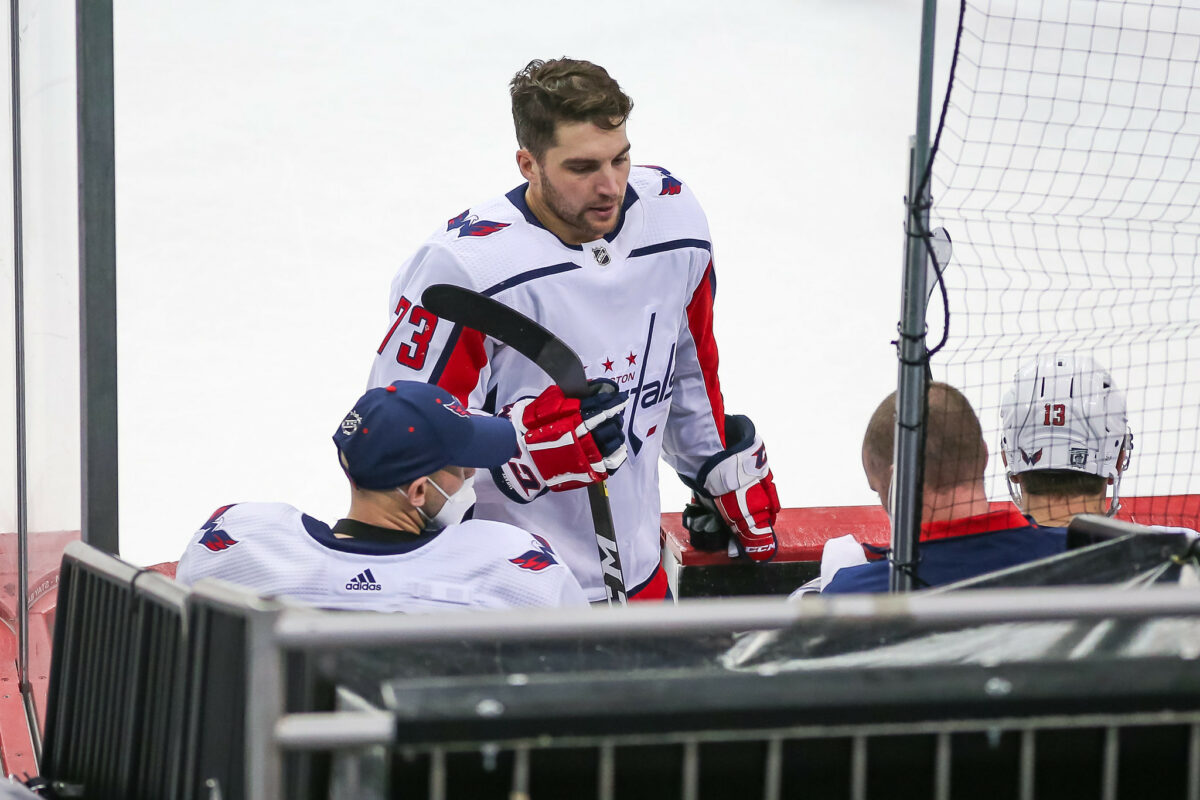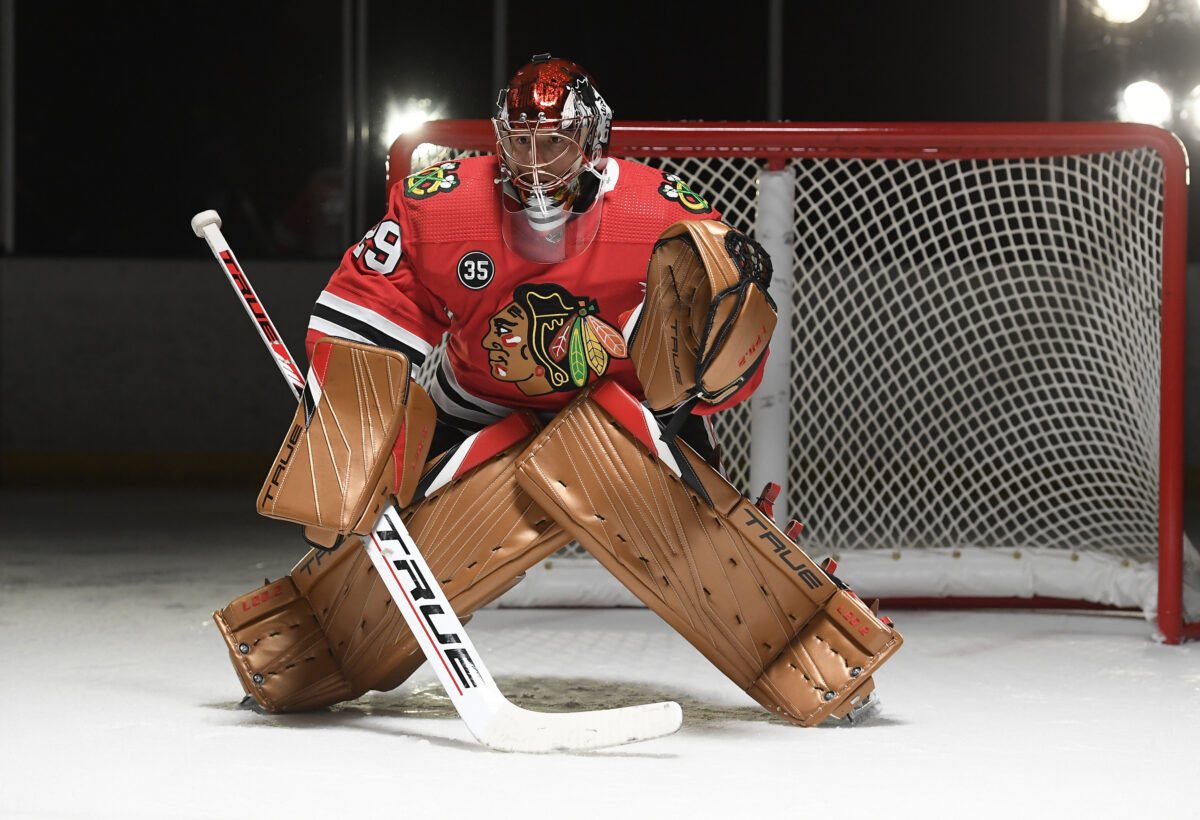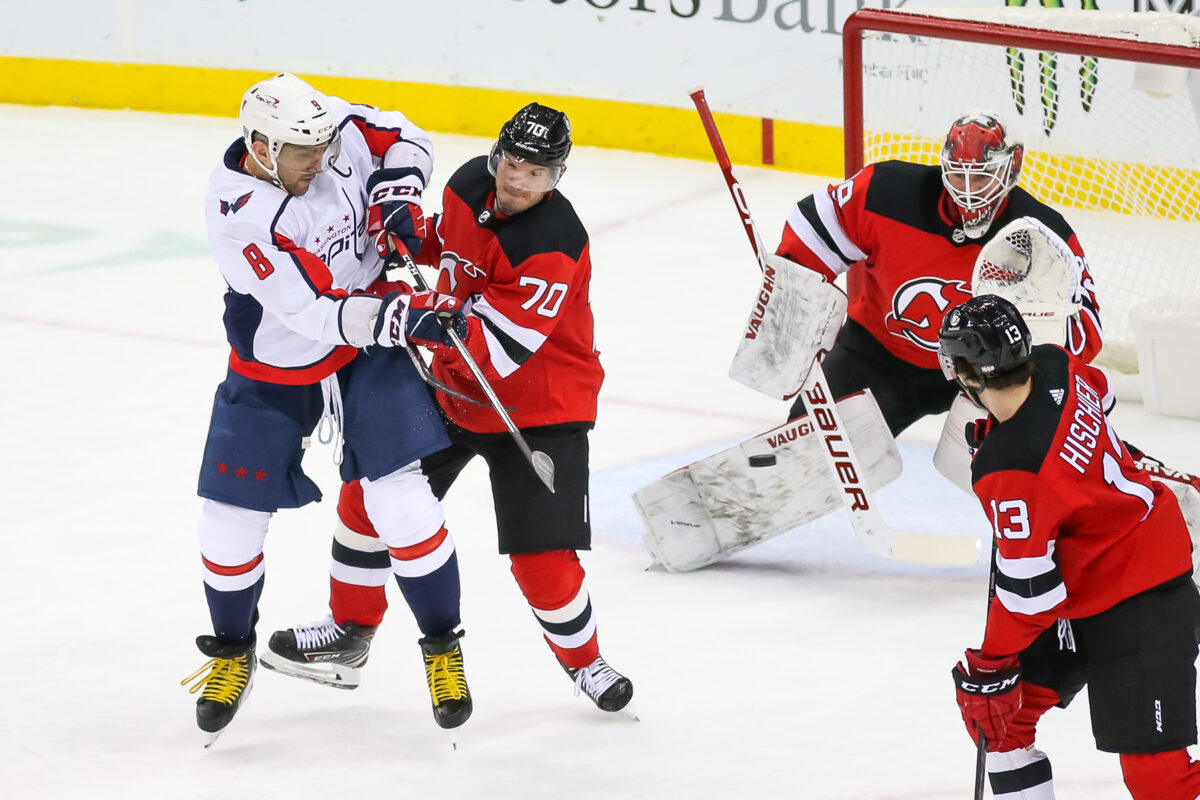Following the Washington Capital’s latest defeat, a 5-3 home loss to the Toronto Maple Leafs, head coach Peter Laviolette’s frustration was clear: “You’re looking at a game where it’s tight,” he said. “I thought we generated a lot, we didn’t give up much until we allowed two goals towards the end of the first period and that’s not good.”
Although the 57-year-old took encouragement from Washington’s fight in the middle frame, he wasn’t impressed with how his team closed out the third period. “Good fight [was shown] to come back in the game, and you get it to a point where you’re pushing down the stretch, and you just got to keep moving forward,” Laviolette added.
Since New Year’s Day, Washington’s inability to stay the course in difficult moments has repeatedly led them to a loss. As THW’s Ted Starkey noted, they have become overly reliant on scoring first. If the Capitals fall behind, they usually lose.
Related: Capitals Are Overly Dependent on Scoring First Goal
In the playoffs, assuming the Capitals hold onto their wild-card spot, the team will have to find a way to overcome adversity or stop conceding early goals. They fell behind against the Maple Leafs within four minutes of puck-drop on Monday, undone by smart forechecking and poor defensive coverage in the slot. From that moment on, the Capitals shifted their focus from controlling the game to staging a comeback.
Ultimately, they lacked the quality and energy to reverse the deficit in the final period. Washington ran out of steam, lost key puck battles behind their own net, and was made to pay for their errors by the visiting side. It’s an issue Conor Sheary identified in his post-game media availability.
“They stripped a couple pucks and were able to keep the puck in the zone, and our guys got a little bit tired, but I don’t think it was anything that they did that we didn’t expect,” Sheary said of Toronto’s fourth goal. “You start running around a little bit when you get tired, and they changed and got fresh guys on the ice, and we just lost our coverage.”

The loss leaves Washington in a pickle. Their 28-18-9 record places them fourth in the Metropolitan Division, six points behind the New York Rangers – who have two games in hand. As it stands, the Capitals are drifting aimlessly towards the postseason, unable to stop their skid in February.
Unless something dramatic changes between now and the playoffs, Washington’s season is likely to end in the first round. Per Money Puck, the Capitals have an 86.9% probability of making the postseason, compared to a one-in-four chance of qualifying for round two. The likelihood of another Stanley Cup parade in D.C? Just 1.2%.
With the NHL Trade Deadline now less than three weeks away, general manager Brian MacLellan must confront several franchise-defining questions. Is this the year to go all-in, or would the Caps be best served by sticking with what they’ve got?
Capitals Should Buy Conservatively at the Deadline
Until recently, the overwhelming consensus amongst analysts was that MacLellan should add quality between the pipes and/or scoring depth on the wing. In doing so, they would keep their core intact, trading only picks, prospects, and one of their restricted free agent (RFA) goalies.
There would be no shortage of players available to the Capitals if MacLellan followed this path. It’s been widely reported that Washington is interested in acquiring Marc-Andre Fleury from the Chicago Blackhawks. The 37-year-old is the best goaltender on the trade block and on an expiring contract. Joonas Korpisalo, who has struggled with the Columbus Blue Jackets this season, is also gettable – although the Caps would need to be certain he is an upgrade on Ilya Samsonov or Vitek Vanecek.

Unlike the market for netminders, which is always relatively muted at the deadline, there are a wealth of forwards that the Capitals could target this month. Phil Kessel, in the final year of his contract with the Arizona Coyotes, is expected to be traded cheaply. Calle Jarnkrok is also likely to be on the move, with the Seattle Kraken hoping to add picks and prospects to their arsenal.
The merits of this strategy are relatively clear-cut: the Capitals would be able to address their weakness in goal and add quality to their middle-six without needing to trade away significant roster players. In other words, MacLellan could run his core back for another playoff push. However, this solution has grown increasingly unattractive since the turn of the year. The team’s form has dipped, Laviolette seems bereft of answers behind the bench, and inconsistent goaltending remains an issue.
Given Washington’s slide, a simple question will be playing on MacLellan’s mind: “Is the team only one or two players away from contending for the Stanley Cup?” Unless his answer is a categorical “Yes”, the Capitals should take a different approach to the trade deadline.
Capitals Should Make Significant Changes at the Trade Deadline
There’s nothing stopping MacLellan from making sweeping changes at the deadline if he believes a marquee acquisition, or two, would push the Capitals over the top. However, this approach would also require him to trade away heftier assets in return.
As March 21 approaches, Arizona defenceman Jakob Chychrun is at the top of the trade board. He’s a high-quality, puck-moving blueliner on a team-friendly contract with term. At just 23, he’s a player for both now and the future. He would, however, be an expensive get for the Capitals, who have struggled defensively since the NHL’s COVID shutdown in December.
John Klingberg, an unrestricted free agent in the summer, is another pricier option the Caps could target if they want to mix up their blue line. The Dallas Stars, drifting out of the playoff race, are likely to shift their pending free agents this month.
As usual, there’s no shortage of high-profile forwards who could be on the move before the deadline. T.J. Miller would inject new urgency into the Capitals’ ailing power play, while Tomas Hertl would completely change the blend of options at Laviolette’s disposal.
All of these moves, though, would require MacLellan to part with his most valuable assets – including Connor McMichael and Hendrix Lapierre. Unless he is certain that his team is only a couple of major moves away from hoisting the Stanley Cup, would it be wise for him to sell the farm or move on from members of Washington’s core? Possibly not.
Capitals Should Stay Away from Trade Deadline Deals
Alternatively, the Capitals could do nothing at the trade deadline. Unless their regular-season form turns completely tragic, they’re (probably) going to qualify for the playoffs anyway, and anything can happen from there.
By taking this approach, MacLellan is staking his reputation on two things: the team’s form will rebound after the deadline, and his roster is already strong enough to make a serious push in the playoffs. There are merits to this idea. It isn’t unheard of for teams to catch lightning in a bottle once the postseason arrives and, with Alex Ovechkin on their roster, that remains a possibility for the Capitals.

Moreover, sitting out the trade deadline market would allow MacLellan to keep his roster and farm intact. As the Ovechkin-era is bound to end eventually, holding onto picks and prospects is as important as ever for the Caps.
Clearly, there are also drawbacks to this approach. If the team doesn’t stumble upon a second wind, they’ll likely crash out of the playoffs in round one, wasting another year of the Ovechkin Capitals’ window to win. Unless MacLellan is confident his players and coach can turn their current slide around, sitting out the deadline wouldn’t be a wise approach.
Capitals Should Sell at the Trade Deadline
The final option available to MacLellan is to sell at the deadline. If, as some predict, the Capitals are headed for a first-round exit regardless of what happens over the next month, should they focus on securing assets that could help them in the future instead?
There are two points to be made about this strategy: it’s incredibly pessimistic and would be obscenely unpopular if implemented. As a result, the Capitals would be wise to pursue other options. However, if 2021-22 is destined to end in failure, could Washington deal a high-profile player – perhaps somebody like Evgeny Kuznetsov – in return for cap relief and futures? It’s an interesting proposition, one that MacLellan might have to consider if the team’s form continues to plummet.
How Should the Capitals Act at the Deadline?
None of the choices available to MacLellan are particularly appealing. As it stands, the Capitals are a long way away from contending for the Stanley Cup, aren’t in a position to make expensive signings at the deadline, and can’t afford to waste another year of Ovechkin’s goal-scoring prowess. In other words, Washington’s GM is snookered unless his team rediscovers their early season form. Until the Capitals start playing at their level, the organization’s approach to the trade deadline will remain confused.
So, for now, at least, MacLellan should hold his nerve and hope the Capitals start to rebound over the next week or so. If they don’t, he could be bounced into making very unpopular – albeit necessary – decisions that will shape the franchise’s trajectory for the next decade. Gulp.

